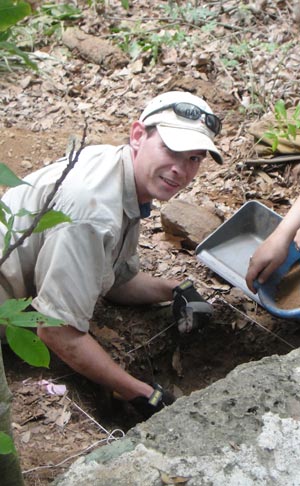John Chenoweth
- Associate Professor of Anthropology, Anthropology Discipline Coordinator, Department of Behavioral Sciences, University of Michigan-Dearborn

- Email: jmchenow@umich.edu
- Phone: 313.583.6368
- Office: 4029 CASL, UM-Dearborn, 4901 Evergreen Road, Dearborn, MI 48128
- Ph.D. 2011, University of California-Berkeley
- CV
Research Interests
Topical/Theoretical
- Historical Archaeology
- Archaeology of Religion, particularly but not exclusively Quakerism
- Archaeological Method and Theory, particularly Practice Theory and Social Identity
- Archaeology of the African Diaspora
- Contemporary Archaeology
- Plantation Archaeology
- Materials Analysis and GIS
Geographical
- Caribbean
- Eastern United States
- Michigan
Research Projects
- The Archaeology of Quakerism.
- Anthropogenic Environmental Change and Religious Community on Lower Cape Cod, 1644-1800.
- Geographies of Quakerism on Barbados.
- Becoming Industrial: Social implications of change in Michigan 1830-1930.
- Materials Analysis: Evaluation of historic ceramics and other typologies, using reflectance spectrophotometry, chemical characterization, porosity, and other replicable measurements.
- Contemporary Archaeology: Several projects studying the modern world with the theoretical and methodological perspectives of archaeology, particularly understandings of nature and culture, and the material aspects of religion.
- The River Raisin Archaeology Project, Monroe, MI, 1784-1813. A multi-ethnic, French-modeled settlement and major War of 1812 battlefield.
Research Description
John M. Chenoweth is an anthropologist and historical archaeologist studying the archaeology of religion and the negotiations between religion, race, class, and other social identities. His work combines archaeological and documentary evidence, practice theory, and geographic and materials science data to understand daily life. Though working in many areas and different groups, one focus has been the Caribbean, especially the British Virgin Islands, and another the Religious Society of Friends (“Quakers”). In particular, he has studied Caribbean Quakers who, despite ideals of equality and pacifism, held enslaved Africans. This culminated in the publication of his first book, Simplicity, Equality, and Slavery, in 2017, as well as a series of articles. He has also worked on Free African sites in the BVI, both before and after emancipation.
Recently, he has initiated a project in eastern Massachusetts, studying how religious community is altered by local anthropogenic environmental change. This includes work on the earliest European settlements on outer Cape Cod and how the social and environmental landscape was changed by deforestation and soil exhaustion. He has also worked in the relatively new area of Contemporary Archaeology, the application of archaeological approaches to the present, studying the implications of contemporary ideas of nature and culture in National Parks—work recently published in American Anthropologist—and contestations of race and identity in popular references to past events and places.
Locally, he leads the River Raisin Archaeology Project in Monroe, where annual fall-semester field schools give UM-Ann Arbor, UM-Dearborn, and other local students an opportunity to learn field archaeology by doing primary research. This late 18th and early 19th century settlement was destroyed in the War of 1812, and provides insight into the encounter between French Catholic, Anglo-American Protestant, and Native religions and cultural identities in the British and early US period. This site and battle were pivotal for both the War of 1812 in the “Old Northwest” and for relations between Native communities and the US government throughout the 19th century. See the UM-Dearborn Archaeology page for more information and a brief video.
He received his PhD in Anthropology from the University of California-Berkeley (2011) and also holds an MA in Anthropology from the University of Pennsylvania (2006). Most recently before coming to Michigan, he was a post-doctoral fellow at Stanford University’s IHUM/Thinking Matters program and a lecturer in Stanford's Anthropology Department (2011-2013).


